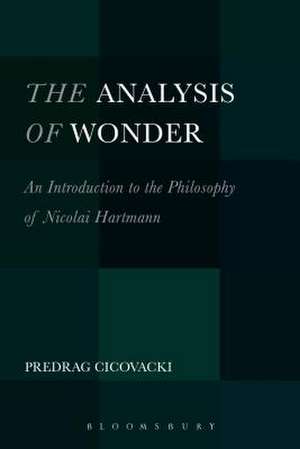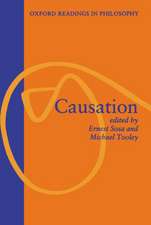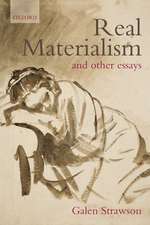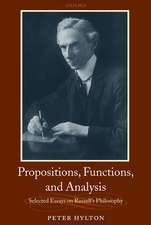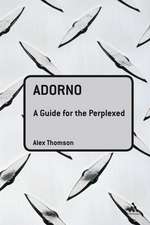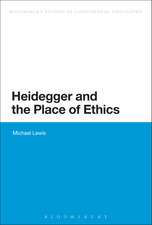The Analysis of Wonder: An Introduction to the Philosophy of Nicolai Hartmann
Autor Dr. Predrag Cicovackien Limba Engleză Paperback – 29 iul 2015
| Toate formatele și edițiile | Preț | Express |
|---|---|---|
| Paperback (1) | 254.55 lei 6-8 săpt. | |
| Bloomsbury Publishing – 29 iul 2015 | 254.55 lei 6-8 săpt. | |
| Hardback (1) | 770.94 lei 6-8 săpt. | |
| Bloomsbury Publishing – 26 mar 2014 | 770.94 lei 6-8 săpt. |
Preț: 254.55 lei
Preț vechi: 293.86 lei
-13% Nou
Puncte Express: 382
Preț estimativ în valută:
48.71€ • 50.67$ • 40.22£
48.71€ • 50.67$ • 40.22£
Carte tipărită la comandă
Livrare economică 14-28 aprilie
Preluare comenzi: 021 569.72.76
Specificații
ISBN-13: 9781501310904
ISBN-10: 1501310909
Pagini: 184
Dimensiuni: 140 x 216 x 10 mm
Greutate: 0.22 kg
Editura: Bloomsbury Publishing
Colecția Bloomsbury Academic
Locul publicării:New York, United States
ISBN-10: 1501310909
Pagini: 184
Dimensiuni: 140 x 216 x 10 mm
Greutate: 0.22 kg
Editura: Bloomsbury Publishing
Colecția Bloomsbury Academic
Locul publicării:New York, United States
Caracteristici
The first full-length work to expore and introduce Hartmann's philosophy in English
Notă biografică
Predrag Cicovacki is Professor of Philosophy and the O'Leary Research Fellow at the College of the Holy Cross, MA, USA. He has published over seventy-five philosophy papers published in English, Serbian, German, Russian, Chinese, and Slovenian and is the author or editor of twelve books, including The Ethics of Nonviolence (2013) and The Restoration of Albert Schweitzer's Ethical Vision (2012).
Cuprins
Chronological TableIntroduction: Does Hartmann Matter?Part I: BeingI.1 Philosophical MethodI.2 Being as BeingI.3 Modifications of BeingI.4 Strata of Real BeingI.5 Categories of Real BeingI.6 Categories of Being and Categories of Cognition I.7. Ontology of CognitionI.8 Critique of Intellectualism Part II: ValuesII.1 Nature of ValuesII.2 Moral Values in GeneralII.3 Four Fundamental Moral ValuesII.4 Four Forms of LoveII.5 Aesthetic Object and Aesthetic ActII.6 Aesthetic ValuesII.7 Truth in ArtII.8 Sublime II.9 Critique of MoralismPart III: PersonalityIII.1 The Realm of Real Being and the Realm of ValuesIII.2 Personality as a ValueIII.3 Pseudo, Spurious and Genuine PersonalityIII.4 Fulfillment of PersonalityConclusion: Hartmann's New Ways of PhilosophyBibliography of Hartmann's WorksIndex
Recenzii
The Analysis of Wonder is both an engaging and enlightening presentation of the philosophy of Nicolai Hartmann, one of the major German philosophers of the first part of the 20th Century undeservedly little known in the English-speaking world. The book's three parts clearly present Hartmann's ontology, theory of values (both ethical and aesthetic ones) and personality, carefully drawing the major connections among them. After a long period of disarray, Hartmann rehabilitated both ontology -his ontology comprises one of the most composite and rich theories of categories ever developed - and developed one of the first systematic theories of values - both ethical and aesthetic - showing how the latter may include and are higher than the former. Cicovacki's book offers a well-balanced, clear introduction to these and other issues and promises to become the reference book for anyone wishing to know Hartmann's philosophy.
This introduction to the life work of Nicolai Hartmann is, to my knowledge, the only book in English to present the entire range of Hartmann's thought. It does so in lucid prose and with sufficient detail so that the reader new to Hartmann can take the measure of his procedure and its outcomes. Hartmann has created a method of research, a work in progress, indeed an edifice of ideas, especially in ethics and aesthetics, that cries out for development. Dr. Cicovacki's book is an important symptom of a welcome resurgence of interest in Hartmann. It will be of great use to professional philosophers who are unfamiliar with him, and to students whom it should encourage to take up the study of this great and unique philosopher.
This is a rewarding introduction to the thought of the last great metaphysician. Cicovacki shows how Hartmann avoids the temptation to over-systematize as he provides categories adequate for informed wonderment before the full splendor of reality.
In The Analysis of Wonder, Cicovacki provides a lively, comprehensive introduction to Hartmann's philosophy in a small package, written in a style that is not overly encumbered by scholarly jargon and technical apparatus, and balances well issues of contemporary relevance with detailed scholarship. It is not only a survey of Hartmann's major ideas, but makes a case for reading Hartmann in light of certain of these ideas-building up to the claim that 'personality' is a synthetic category and reality which brings together Hartmann's ontological and axiological work. It is an important contribution to a growing English-language literature on this neglected major German philosopher.
A splendid introduction [to Nicolai Hartmann] for the English-speaking world. [.] Cicovacki has presented us with an interesting and concise summary of Hartmann's thought in systematic presentation [. and] offers a handy and easy-to-read introduction to a difficult and original thinker. The prose is clear and lucid. For anyone wanting to rediscover a giant of the 20th century, this book is an excellent place to start.
On the whole, it is clear that Hartmann's philosophy is dauntingly complex and idiosyncratic; nevertheless, Cicovacki elegantly captures this complexity in clear and engaging analysis. As a compelling introduction to Hartmann's philosophy, accessible to general and specialized audiences, Cicovacki has succeeded.
This introduction to the life work of Nicolai Hartmann is, to my knowledge, the only book in English to present the entire range of Hartmann's thought. It does so in lucid prose and with sufficient detail so that the reader new to Hartmann can take the measure of his procedure and its outcomes. Hartmann has created a method of research, a work in progress, indeed an edifice of ideas, especially in ethics and aesthetics, that cries out for development. Dr. Cicovacki's book is an important symptom of a welcome resurgence of interest in Hartmann. It will be of great use to professional philosophers who are unfamiliar with him, and to students whom it should encourage to take up the study of this great and unique philosopher.
This is a rewarding introduction to the thought of the last great metaphysician. Cicovacki shows how Hartmann avoids the temptation to over-systematize as he provides categories adequate for informed wonderment before the full splendor of reality.
In The Analysis of Wonder, Cicovacki provides a lively, comprehensive introduction to Hartmann's philosophy in a small package, written in a style that is not overly encumbered by scholarly jargon and technical apparatus, and balances well issues of contemporary relevance with detailed scholarship. It is not only a survey of Hartmann's major ideas, but makes a case for reading Hartmann in light of certain of these ideas-building up to the claim that 'personality' is a synthetic category and reality which brings together Hartmann's ontological and axiological work. It is an important contribution to a growing English-language literature on this neglected major German philosopher.
A splendid introduction [to Nicolai Hartmann] for the English-speaking world. [.] Cicovacki has presented us with an interesting and concise summary of Hartmann's thought in systematic presentation [. and] offers a handy and easy-to-read introduction to a difficult and original thinker. The prose is clear and lucid. For anyone wanting to rediscover a giant of the 20th century, this book is an excellent place to start.
On the whole, it is clear that Hartmann's philosophy is dauntingly complex and idiosyncratic; nevertheless, Cicovacki elegantly captures this complexity in clear and engaging analysis. As a compelling introduction to Hartmann's philosophy, accessible to general and specialized audiences, Cicovacki has succeeded.
